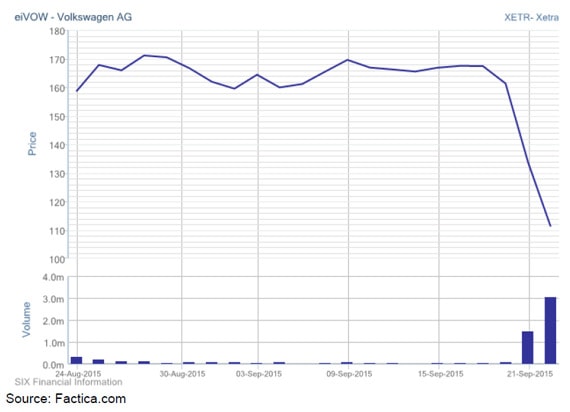 VW’s emissions scandal is looking likely to become an all-time business school case study on reputational damage. It is an interesting one to examine in more detail.
VW’s emissions scandal is looking likely to become an all-time business school case study on reputational damage. It is an interesting one to examine in more detail.
Four days in from the revelations, there are a range of views emerging that highlight the different ways people respond to what they see and hear.
Whilst the front page headlines are focused on “Scandal” and the hunt for who authorised, who knew and whose head must be placed in the corporate noose, conversations with a range of car industry employees reveals a range of different perspectives that are thought-provoking.
One car mechanic who runs an MOT test station in Britain urged me to start my car’s diesel engine, engage neutral and then rev the engine – “it’s limited to around 2500rpm so that in the annual MOT’s emissions test it will pass. Once you engage a gear and start driving, the software allows you to rev at far higher speeds – and the pollutants go up.”

I tried it and he was right, the car is limited to 2500 rpm when stationary and in neutral. So is that cheating on the emissions test here in Europe?
“Not at all.” said a spokesperson from a car manufacturer (who wishes to remain anonymous). “The rev limiter was put in because back in around 2008, the MOT tests required testers to rev the cars to their maximum rpm and some cars experienced engine failures when kept at max rpm. We put in software that limits the maximum revs in this situation. Lower rpm does mean lower emissions, but we aren’t doing anything illegal. We comply with the legislation in every market where we sell cars. We are focused on the interests of our customers and saving them from an expensive engine failure in the test is in their interest.”
Another mainstream manufacturer pointed out that their manual diesel cars don’t have such limiters, but their automatics do, simply to protect the torque converter.
So are such rev limiters cheating? Is it a deception device? It may comply with the law … but does it comply with the spirit of the law? It raises the question of where to draw the line.
If you give an engineers a problem, and the strict California emissions tests were certainly giving car manufacturers one, then their job is to create an engineering solution. According to an engineer I spoke to, the solution in this case appears to have been that the VW software detects the parameters that suggested the car was doing an emissions test and at the legally pre-determined test rpm, it ensured that the emissions were reduced to levels that passed the test. Once the car was back on the road, gears engaged and the car moving, the software went back to the ‘normal’ mode that gives the driver best performance rather than lowest emissions.
So from an engineering perspective, the issue of the very low emissions regulations in California was solved by some comparatively simple software code programming. It was a low cost and rather neat engineering solution for a manufacturer who wanted to sell diesel cars in that region.
However, creating a low-cost, neat engineering solution rather misses the point. Hence today’s “scandal” headlines. It is actually about the corporate values and how they align with a society’s values and expectations. Trust is everything and once broken, it is hard to fix. Saying one thing and doing another breaks trust, communicating your values and aligning yourself with the society with whom you are doing business and then admitting you were deceiving everyone in that society completely undermines reputation and potentially the viability of your business in that society.
In today’s ultra-connected world, brand is all about trust in the human to human interactions that we have through our media, social media, purchases and services that corporations deliver.
A comparison with athletics and sport makes an interesting analogy. If you want an athlete to perform better, in human engineering terms the quickest and easiest way to get them to do so, is to use drugs to build the right type of muscle for their sport.
However, undoubtedly that cheating which is why the use of drugs in sport is banned and there is a sad line up of media stories about athletes and coaches who have broken the rules in order to win.
In doing so, they have also broken the trust of their fans, their fellow athletes and their sporting event organisers. Their reputation is trashed.
The big issue for VW is not that they have created the engineering solution to a problem of regulatory limits, but that they did so covertly and used it at a time when they were proclaiming the benefits of their new ‘clean’ low emission diesel engines to drive up sales.
In doing so, VW broke the trust of their buyers about the emissions performance of their products, and the trust of the society and its legislators, with whom they were doing business. They and their corporate leadership are now finding out the true cost of not valuing and using reputational risk analysis and enforcing their organisational values to drive the decision making at every level of their business… including their emission engineers. Hence their reputation is being trashed.
So is it right that the media are simply shaming and blaming VW for their actions?
There is a school of thought that some of the blame must also lie with poor regulation and legislation that allowed the test procedures to remain standardised and static for so long. In doing so, they created a situation that allowed engineers to create the software code to meet them.
If the emissions test procedures had been regularly updated to ensure they were fit for purpose, they could have changed the test to ensure that the level of emissions was checked at a range of engine speeds or even when driving on the road.
Indeed, with today’s sophisticated monitoring and engine management systems, engineers may be able to devise a system that has the car’s engine management system monitor its exhaust emissions and record them on a flash memory module. Testers could then simply download the data in the same way that the data on an aircraft black box recorder is downloaded by air accident investigators. It would make it easy to see if the car did or did not meet the regulations.
Indeed the emissions regulations in Europe as well as the USA, need to be updated to reflect changing environmental targets. Such an approach would make the sort of solution that VW has apparently put into 11 million of its cars, useless and ineffective.
Here in the UK, the standard annual MOT test is similarly outdated and in one MOT tester’s view,
“…needs to be changed to make it more relevant and accurate across a range of real world driving situations.” In fact, the industry is pressing European legislators very hard to finalise a new fuel consumption and emissions test cycle, which will include "real world" driving. The vital details of that have yet to emerge, much to the frustration of car manufacturers.
All this begs the question as to whether VW is the convenient media ‘fall guy’ of the moment or whether others should shoulder some of the responsibility and take action to tighten the potential loopholes – in the same way that drug testing for athletes is constantly updated to detect those who try to cheat?
One thing is clear, legislators and manufacturers on both sides of the Atlantic are rapidly checking on whether they may have a problem closer to home and if so, whether the cross-wires of the media sights will turn on them.
It is because of the collapse of trust in an auto manufacturer who claimed to have not just cars that
met environmental legislation but be “environmentally friendly” that this story will not go away.
Just as an athlete’s reputation is damaged for life once they are found to have been a drugs cheat, VW and any others who may be found to have created and used similar software programmes to “beat the test” will suffer longer term reputational damage.
It will also have some degree of reputational damage for diesel as a fuel source, highlighting the downsides of its pollutants in our cities.
Potentially it may also hit Germany’s reputation for engineering excellence, though the latter may change if other car manufacturers in other countries become embroiled in the crisis, or if VW is found to have acted alone.
 The only good news coming out of this is that electric car manufacturers must be eyeing up new opportunities as buyers in California and elsewhere start to shun diesel cars. Good news for BMW, Nissan and Tesla to name but three!
The only good news coming out of this is that electric car manufacturers must be eyeing up new opportunities as buyers in California and elsewhere start to shun diesel cars. Good news for BMW, Nissan and Tesla to name but three!
Article written by Warwick Partington. Warwick is a Strategic & Crisis Communications Consultant at the MTM Centre for Leadership and Management Development in Broadway, Worcestershire.
PR Masterclass: The Intersection of PR and GEO
Wednesday 25th February, both virtual and in person tickets are available.
PR MasterclassIf you enjoyed this article, sign up for free to our twice weekly editorial alert.
We have six email alerts in total - covering ESG, internal comms, PR jobs and events. Enter your email address below to find out more:





